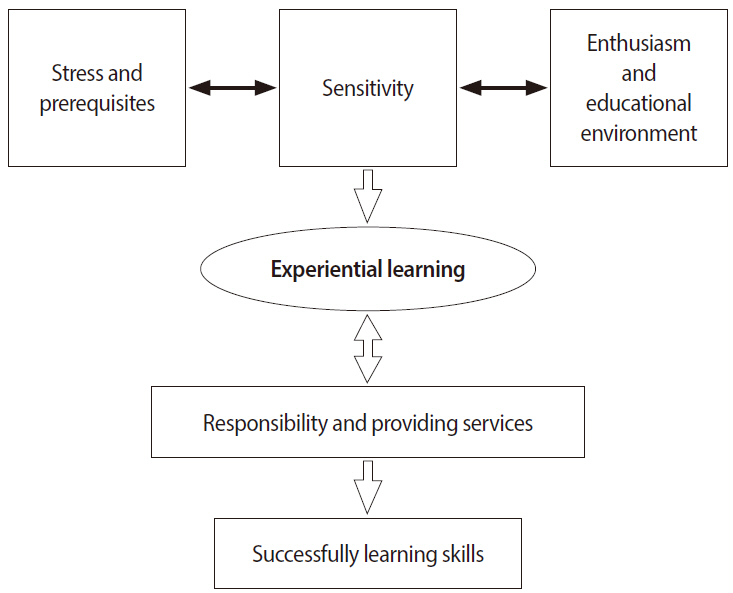J Educ Eval Health Prof.
2015;12:29. 10.3352/jeehp.2015.12.29.
Vaccination learning experiences of nursing students: a grounded theory study
- Affiliations
-
- 1Department of Nursing, Esfarayen Faculty of Medical Sciences, Esfarayen, Iran.
- 2Evidence-Based Care Research Center, Department of Medical-Surgical Nursing, School of Nursing and Midwifery, Department of Medical Education, Faculty of Medicine, Mashhad University of Medical Sciences, Mashhad, Iran. karimi2001@yahoo.com
- 3Department of Biostatistics, Faculty of Health, Mashhad University of Medical Sciences, Mashhad, Iran.
- 4Department of Nursing, Nursing and Midwifery School, Zabol University of Medical Sciences, Zabol, Iran.
- KMID: 2402036
- DOI: http://doi.org/10.3352/jeehp.2015.12.29
Abstract
- PURPOSE
This study aimed to explore the experiences of nursing students being trained to perform vaccinations.
METHODS
The grounded theory method was applied to gather information through semi-structured interviews. The participants included 14 undergraduate nursing students in their fifth and eighth semesters of study in a nursing school in Iran. The information was analyzed according to Strauss and Corbin's method of grounded theory.
RESULTS
A core category of experiential learning was identified, and the following eight subcategories were extracted: students' enthusiasm, vaccination sensitivity, stress, proper educational environment, absence of prerequisites, students' responsibility for learning, providing services, and learning outcomes.
CONCLUSION
The vaccination training of nursing students was found to be in an acceptable state. However, some barriers to effective learning were identified. As such, the results of this study may provide empirical support for attempts to reform vaccination education by removing these barriers.
MeSH Terms
Figure
Reference
-
1. Nikula A, Nohynek H, Puukka P, Leino-Kilpi H. Vaccination competence of graduating public health nurse students. Nurs Educ Today. 2011; 31:361–367. http//dx.doi.org/10.1016/j.nedt.2010.07.007.
Article2. Mtshali N. Implementing community-based education in basic nursing education programs in South Africa. Curationis. 2009; 32:25–31.
Article3. Pelly LP, MacDougall DMP, Halperin BA, Strang RA, Bowles SK, Baxendale DM, McNeil SA. l. THE VAXED PROJECT: an assessment of immunization education in Canadian health professional programs. BMC Med Educ. 2010; 10:86. http://dx.doi.org/10.1186/1472-6920-10-86.
Article4. Vorsters A, Tack S, Hendrickx G, Vladimirova N, Bonanni P, Pistol A, Metlicar T, Pasquin MJ, Mayer MA, Aronsson B, Heijbel H, Van Damme P. A summer school on vaccinology: responding to identified gaps in pre-service immunisation training of future health care workers. Vaccine. 2010; 28:2053–2059. http://dx.doi.org/10.1016/j.vaccine.2009.12.033.
Article5. Yamazhan T, Durusoy R, Tasbakan M, Tokem Y, Pullukcu H, Sipahi O, Ulusoy S; Turkish Nursing Hepatitis Study Group. Nursing students’ immunisation status and knowledge about viral hepatitis in Turkey: a multi‐centre cross‐sectional study. Int Nurs Rev. 2011; 58:181–185. http:dx.doi.org/10.1111/j.1466-7657.2010.00869.x.
Article6. Corbin J, Strauss A. Basics of qualitative research: techniques and procedures for developing grounded theory. 3rd ed. Thousand Oaks (CA): SAGE Publications, Inc.;2007. p. 400.7. Nikula AE, Rapola S, Hupli MI, Leino-Kilpi HT. Factors strengthening and weakening vaccination competence. Int J Nurs Pract. 2009; 15:444–454. http://dx.doi.org/10.1111/j.1440-172X.2009.01781.x.
Article
- Full Text Links
- Actions
-
Cited
- CITED
-
- Close
- Share
- Similar articles
-
- Korean Nursing Students' Experience of Ego Identity Development
- Preceptees' Experiences of Nursing Students in the Clinical Practice with Preceptorship: “Being refined while taking a firm stand with lackâ€
- Threats to Identity: A Grounded Theory Approach on Student Nurses' Experience of Incivility during Clinical Placement
- Countertransference Experience of Nursing Students in Psychiatric Nursing Practice
- Self-isolation Experiences of Nursing Students with COVID-19


